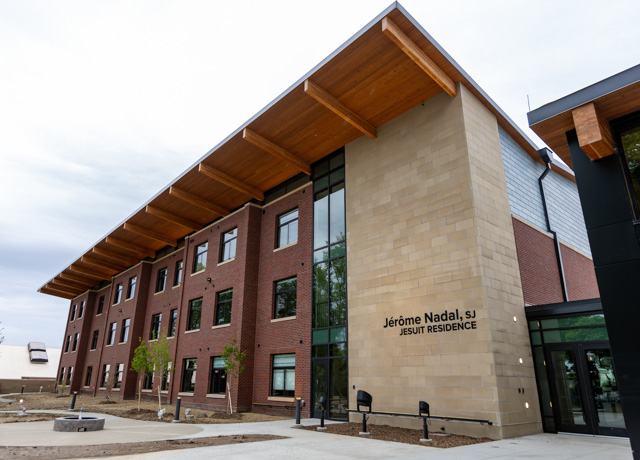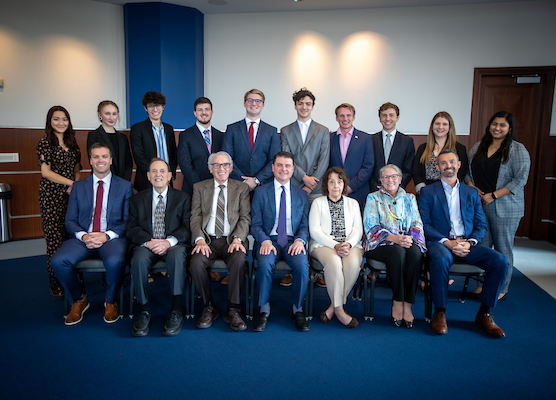Featured Testimonial About Creighton University
It’s moments like these, where there’s such an opportunity to be the kind of nurses we’re trained to be at Creighton.
By Micah Mertes
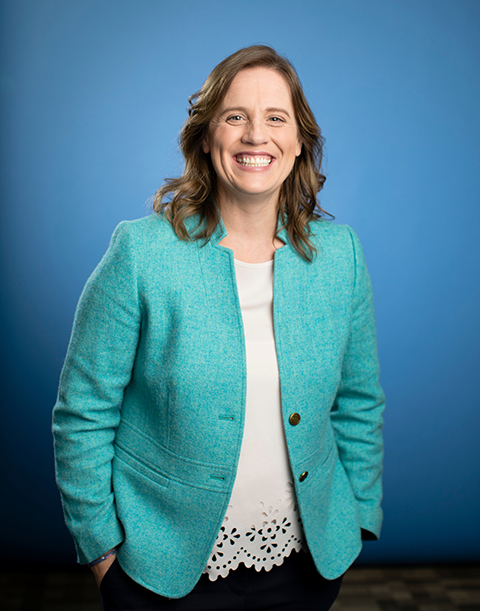
Being a nurse — especially a Creighton nurse — is all about walking with patients and their families, says Meghan Potthoff. Sometimes in the most literal sense.
Potthoff, BSN'01, PhD, APRN-NP — an associate professor recently installed as the Keough Family Endowed Chair in the College of Nursing — recalls one moment early in her career when she was working as an ICU nurse …
Families whose children are facing a terminal diagnosis sometimes have the option of leaving the ICU for a more comfortable living space in the hospital, a room that feels more like home.
Potthoff was caring for such family, and the mother was reluctant to leave the ICU, saying she was frightened by the transition.
Potthoff didn’t understand why. It was just a few hundred steps to the new room. She told the mother she could wheel her son in his crib to the new room.
No, that feels wrong.
Potthoff told her she could carry him there.
No. I don’t think I can carry my son to the place where he’s going to die. Can you carry him for me?
“Here I was, worried about setting up pumps and the technology in the room,” Potthoff says now. “But what she needed from me at that moment was just to be there, to help her break through this barrier and take that journey with her.”
And so Potthoff carried the boy to the new room, his mother beside them.
It’s moments like these that inform everything Potthoff does — as a nurse practitioner, an educator and a researcher.
“It’s moments like these,” she says, “where there’s such an opportunity to be the kind of nurses we’re trained to be at Creighton.”
As Potthoff becomes the inaugural holder of the first endowed chair intended solely for the College of Nursing, we spoke with her about her passion for pediatric palliative care, her unlikely path to research and the privilege she feels getting to walk with families through the most difficult journeys of their lives.
* * *
What will being installed as the Keough Family Endowed Chair mean for you?
First off, it’s a really exciting and humbling moment. You want to live up to the expectations.
The No. 1 limit of a faculty member’s ability to accomplish all they want to accomplish is time. If I were a really good researcher, I’d probably figure out how to add six more hours to the day. Thanks to generous donations of people like Kathy Keough Soto and the Keough Foundation, the college has the support to give us more time.
With the endowed chair, I’ll be freed up from some teaching and other responsibilities to focus time on some of the pilot work of my research, which will increase our chances of getting bigger grants and conducting this research on a larger scale.
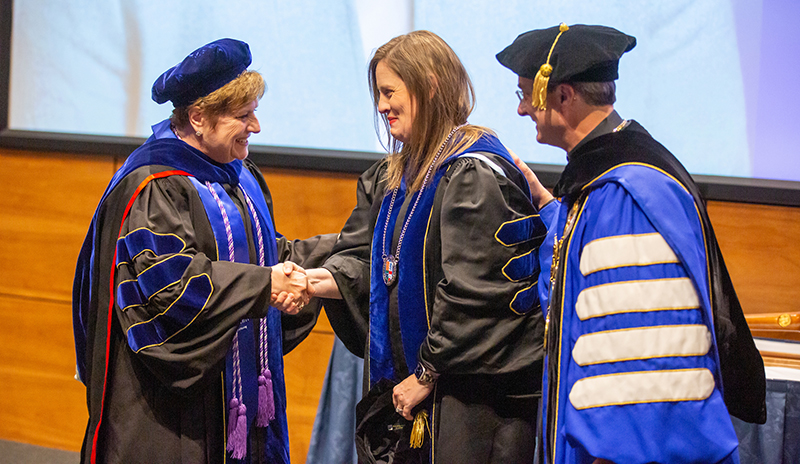
You started out in clinical practice. What brought you to research?
I came to Creighton initially focused on wanting to develop and add some academic programs in the area of pediatric acute care nursing. I have a real passion for taking care of acutely ill or hospitalized children. Being a Creighton alum, I knew the rigor of education and the support a new academic program would receive from the University. So when I came here, that was my mission. I had no idea I would end up becoming a researcher.
If you would have told me when I was an 18-year-old nursing student at Creighton that I would one day be a faculty researcher, I would have laughed in your face. But along the way I got the bug for research. The idea of discovering problems and trying to find a solution or creating a solution really got me excited. I feel blessed that I have a clinical background as a nurse practitioner who still has a clinical practice and that I’m now able to partner that with my research background.
I kind of wear both hats. I can see problems that are happening in my clinical practice, but my brain can start to turn and ask, “What are ways we can fix this?”
What does your research focus on?
Pediatric palliative care. Over the years, palliative care of children and families has become my passion. Because as a young nurse, I saw many deaths of children. In a lot of cases, we were trying to fit these children into an adult model of palliative care, and it just wasn’t working very well. We needed new ideas and better models to fit the needs of the children and their families.
Right now, we’re asking, how can we provide better services that reach greater numbers of people? How do we use altered models and technology to provide care outside of Omaha, particularly in underserved rural areas?
We’re in the process of some preliminary groundwork and data collection. We hope to use what we’ve learned to set the stage for bigger grants and expanded research.
You made a card game to help parents of terminally ill children. How did this come about?
I had focused my doctoral work on developing an intervention to help parents verbalize their priorities. It’s a card game called Go-Wish Pediatrics. There’s a version for adults where they’re planning their own end-of-life goals. I modified the game with some parental involvement and tested it with parents in palliative care.
When we work with parents and ask them, “What do you need for the palliative care of your child,” they don’t know what to say. They don’t know what to ask for.
Using this card game, which has about 50 prompts, allows them to bring up questions they might feel uncomfortable or weird asking otherwise. Questions like: Am I weird to say that I’m worried about finances right now? Is that not appropriate to say when my child is going through this? Giving parents prompts gives them permission to say what their hopes, fears and priorities are.
We’ve printed Go-Wish Pediatrics, and it should be widely available in the coming months. It’s exciting to have that out there to help families.
How can faculty research be balanced with educating new nurses?
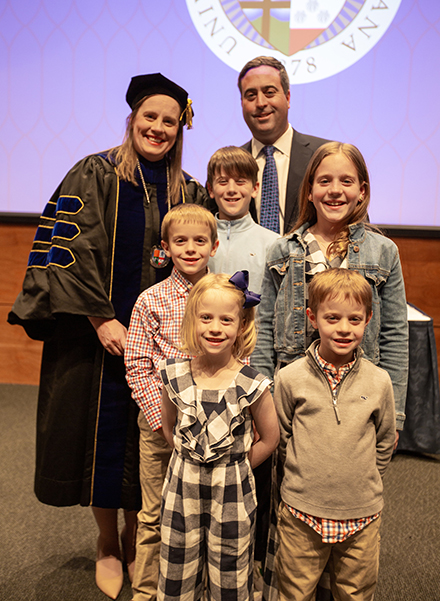
The College of Nursing and Dean Catherine Todero have really emphasized a shift in prioritizing research and individuals who want to do research, but without taking from the quality of education we bring to our many students. Creating opportunities for research gets our name out there and helps us recruit both new faculty and new students.
I hope to draw students into my projects and work with them on research. That’s the trickle effect of the donors’ investment and the nursing college’s commitment to research. It’s such a huge thing, and it will have an impact far beyond Creighton.
It’s important for our students to see faculty doing research. It’s important for them to think about things on a larger scale. Because if we don't have people testing new ideas, we won't change the face of health care. If we’ve learned anything in the last few years, we have to look at new, inventive models. We have to get more creative as we develop new models of care.
Your experience as a nurse practitioner and ICU nurse has served as its own kind of research. What are some of the key things you’ve learned that you’ve applied to your work at Creighton?
One thing that makes palliative care so special is it’s an area that exemplifies working together as a team, the kind of interprofessional care and education Creighton has really become a leader in. When we are working with the family, we are also talking with chaplains and social workers, physicians, nurses and pharmacists, everybody coming together to care for this family the best way we can. Palliative care is where we see interprofessional models at their best.
We’re going to need unique leaders of interprofessional work going forward, and we really have an opportunity to lead the way here by listening to what our patients and their families need most.
With the many different kinds of care you’ve provided for patients, why do you think pediatric palliative care became your calling for research?
When we think about being for and with others and walking in their shoes, the experience of sitting with a family as their child passes away is such a unique opportunity to live our mission as Creighton nurses. I feel fortunate to be there to help them in those moments.
To help them, you don’t have to do a lot, necessarily. It’s not about solving a problem. You have to listen. You have to be with them. Sometimes it’s the simplest things, like sitting there and helping them give their child a final bath.
Helping them through that … it’s unrelatable to anything I’ve experienced. I feel very privileged that they allow me to take this journey with them.
* * *
Read more about the Keough Family Endowed Chair in Nursing.
Watch a video about Potthoff and the new endowed chair position
